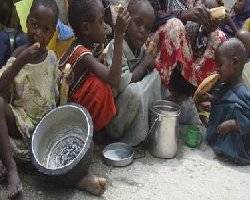The head of the United Nations refugee agency has described the situation in drought-hit Somalia as the "worst humanitarian disaster" in the world, after meeting with those affected at the Dadaab refugee camp in Kenya.
The camp, located in the northeast and the world's largest in the world, is overflowing with tens of thousands of refugees from Somalia, Ethiopia and within Kenya.
Antonio Guterres, the head of the United Nations High Commission for Refugees (UNHCR), visited the camp on Sunday, appealing for "massive support" from the international community for the more than 380,000 people estimated to be living in Dadaab.
"I have no doubt that in today's world, Somalia corresponds to the worst humanitarian disaster. I have never seen in a refugee camp people coming in such desperate conditions," he told Al Jazeera.
"I saw a mother that had lost three of her children on the way here."
Guterres said that those at the camp were "the poorest of the poor and the most vulnerable of the vulnerable".
The UNHCR chief is on a tour of the region in order to highlight the plight of those affected by the drought.
The World Food Programme estimates that more than 10 million people are already in need of humanitarian aid, with the UN Children's Fund estimating at least two million children are suffering from malnourishment.
Those children are in need of lifesaving action, the UN says.
On Thursday, Guterres visited the Ethiopian camp of Dollo Ado.
"The mortality rates we are witnessing are three times the level of emergency ceilings," he said.
"The level of malnutrition of the children coming in is 50 per cent. That is enough to explain why a very high level of mortality is inevitable."
Thousands flee
Hundreds of thousands of people continue to flee the drought, walking for days in search of food and water.
According to doctors in Dadaab, most of the children have severe cases of acute malnutrition and related complications such as anemia.
"The children are presenting with skin complications where their skin is peeling off mainly due to deficiency in micro-nutrients," Dr Milhia Abdul Kader said. "They are coming in a very bad shape."
Most of the arrivals to the camps are women and very young children, many of whom are in very bad physical condition, Al Jazeera's Azad Essa, reporting from Dadaab, said.
"Every morning hundreds turn up at the registration sites, where they hope to get documented and receive some basic essentials," he said.
"But the process is long and people are waiting for days to complete registration and access food, having already walked for days to get here."
The epicenter of the drought lies on the three-way border shared by Kenya, Ethiopia and Somalia, a nomadic region where families depend heavily on livestock.
Uganda and Djibouti have also been hit by the crisis.
'Absolutely desperate'
Thousands more are waiting at reception centers outside the Dadaab camp.
"The people that are arriving are absolutely desperate," Andrew Wander of Save the Children, a UK-based charity, said.
"They haven't eaten for weeks; they've been travelling for a long, long time in very difficult situations."
Wander said 1,500 people were arriving in Dadaab every day and that the situation was "extremely serious".
Doctors with Médecins Sans Frontières (MSF) told Al Jazeera the camps were being stretched to capacity.
"The situation in the outskirts of the established camps are catastrophes waiting to happen," said Essa.
"There are literally thousands of huts assembled out of tree branches, covered by plastic sheets provided by the UN.
"These refugees have registered, but there is no space for them in any of the three camps, so they have just effectively created their own one."
As well as providing medical help, aid agencies are trying to distribute food and water to the hundreds of thousands of people reaching Dadaab.
"To deliver aid inside Somalia is a very important priority. When we see people in such a desperate situation, it would be much better if they could be supported inside the country," Guterres said.
PHOTO CAPTION
Somali children from Southern Somalia eat food outside a building, Tuesday, July 5, 2011, as they wait to go to the internally displaced camps in Mogadishu, Somalia, after they fled from southern Somalia.
Source: Aljazeera.net


 Home
Home Discover Islam
Discover Islam Quran Recitations
Quran Recitations Lectures
Lectures
 Fatwa
Fatwa Articles
Articles Fiqh
Fiqh E-Books
E-Books Boys & Girls
Boys & Girls  Ramadan
Ramadan Fatwa Audios
Fatwa Audios Month of Mercy
Month of Mercy Women
Women Eed Al- Fitr
Eed Al- Fitr Food Recipes
Food Recipes Videos
Videos

 Prayer Times
Prayer Times












